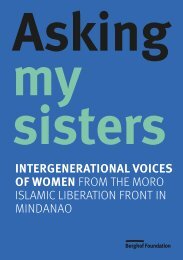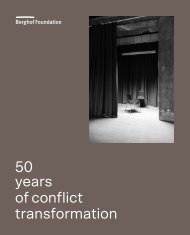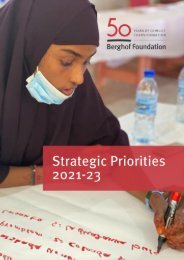Strategic Priorities 2022-2025
In order to adopt to a digitalised world, a planet facing ecocide through climate change and further global challenges, the Berghof Foundation as an organisation has to evolve as well. We are therefore expanding our activities beyond our established focal areas into six additional areas of strategic importance. How Berghof intends to go about it over the next four years is the subject of this document.
In order to adopt to a digitalised world, a planet facing ecocide through climate change and further global challenges, the Berghof Foundation as an organisation has to evolve as well. We are therefore expanding our activities beyond our established focal areas into six additional areas of strategic importance. How Berghof intends to go about it over the next four years is the subject of this document.
You also want an ePaper? Increase the reach of your titles
YUMPU automatically turns print PDFs into web optimized ePapers that Google loves.
4 Digital revolution and its impact on our work<br />
Developments in digital technologies and artificial intelligence (AI) are fundamentally reshaping<br />
the nature of conflicts, and the tools and methods to transform them.<br />
Information technology and big data continue to<br />
increase the volume and variety of information that can<br />
be gathered at low-cost and in real-time. We will make<br />
increased use of that information to improve our conflict<br />
analysis and explore new, innovative means to manage<br />
and visualise it.<br />
The digital space plays an increasingly important role in<br />
conflicts and peace processes. Today, news can be<br />
easily manipulated, and social media is subject to little<br />
quality control, which makes it all too easy to fuel<br />
hatred and exacerbate polarisation. Conflict parties or<br />
spoilers of peace processes can use this as part of their<br />
information warfare or to undermine a negotiated<br />
settlement. To navigate in this context, we will explore<br />
new communication technologies and build on our<br />
experience in combining conflict transformation, peace<br />
education and digitalisation to de-escalate new media<br />
and communication wars.<br />
We will also continue to try out new communication<br />
techniques to create creative forms of engagement that<br />
can complement our traditional communication<br />
channels. New formats can be used as an opportunity<br />
for more inclusive dialogue, and allow for the<br />
The app “Streitkultur 3.0” helps young people identify and<br />
counter disinformation and hate speech online, Image:<br />
Berghof Foundation<br />
integration of a broader variety of perspectives. This can increase the legitimacy and ownership<br />
of peace processes.<br />
As conflicts increasingly move into cyberspace and make use of AI, cyber diplomacy is needed<br />
to prevent escalation. We will explore which new possibilities for conflict transformation could<br />
be opened up by cyber diplomacy and AI tools.<br />
5 Dealing with the past in conflict transformation<br />
It is widely acknowledged that the way in which past gross human rights violations are discussed<br />
and addressed, influences the likelihood of sustainable conflict transformation. For<br />
peacebuilding to work, all levels of society must be able to constructively deal with the violence<br />
of the past to ensure that the conflict will not resume.<br />
Page 12 | 13










